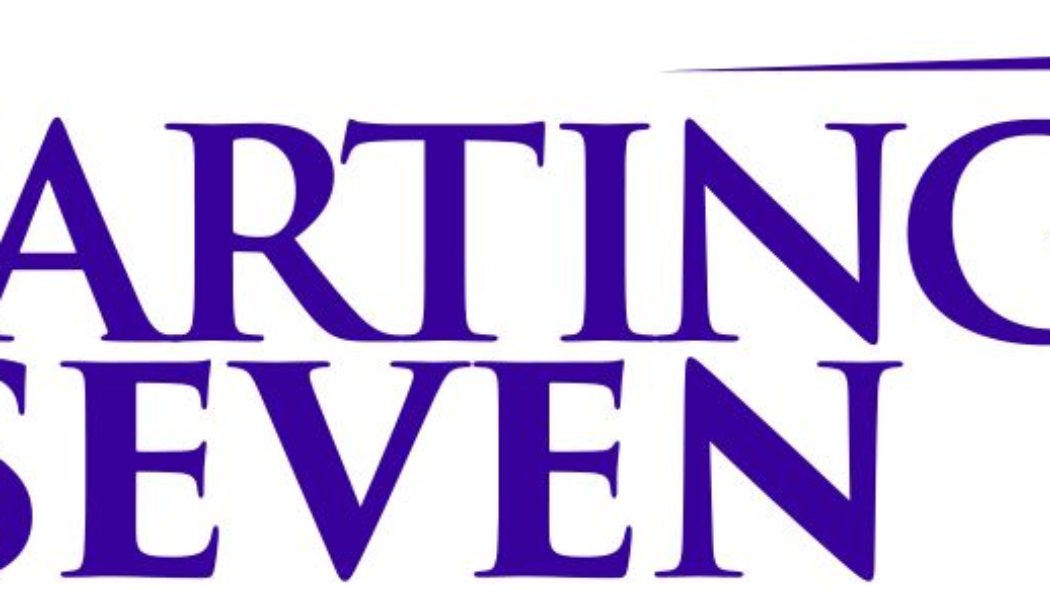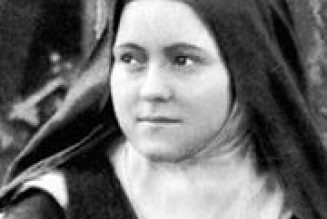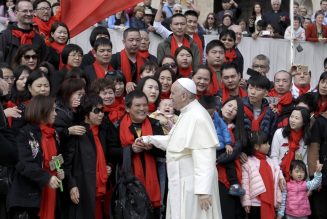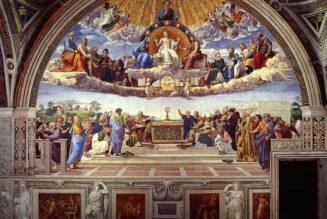Hey everybody,
Today is the feast of St. Francis of Assisi, known among the Franciscans as the Seraphic Father — the penitent, the prophet, the mystic, the pilgrim, and one of the most misunderstood saints of all time.
From his death in October 1226, Francis has loomed large in the global Catholic imagination – or at least some version of him usually has.
In recent decades, “Hippie Minstrel Francis” has been the most popular version in American public culture, a figure who would have been unrecognizable to the Poverello himself.
The best biographies of St. Francis recognize that even during the saint’s life, competing takes emerged among his brothers of what exactly Francis was trying to do, and why, and what it would mean for their lives.
Of course, I’ve got my own take on who Francis was, and what his poverty meant, and what he was trying to do from his base camp of a couple of hovels outside Assisi. But I think St. Francis would just as soon prefer I not go on about him for too long.
I think the Seraphic Father would rather point us to Jesus than expect us to dwell too long on his servant — Francis would rather we see the Lord than see his prophet.
So if you want to honor St. Francis today, you might consider spending some time in an adoration chapel, praying on the mystery of Christ’s cross. It’s where Francis most wanted to be.
The News
While Ukrainian forces continue to push Russia’s military eastward – aiming to extract Russia entirely from Ukrainian territory, Russia’s President Vladimir Putin has formally claimed parts of Ukraine for his country, and warned that Russia will defend those territories, even with nuclear weapons, if it comes to that.
Things are, as it were, escalating in Eastern Europe. And Pope Francis on Sunday urged Putin to stop the war’s “spiral and violence of death,” while also urging Ukrainian President Volodymyr Zelenskyy to “be open to serious proposals for peace.”
That plea left a lot of Catholics – especially those in Ukraine – puzzled, asking mostly whether there really are serious proposals on offer in Ukraine.
In an analysis yesterday, Ed took a look at what Pope Francis might have been getting at — and how the pope’s latest plea fits into the rest of what he’s had to say about this war.
Consider that during a recent meeting with Jesuits from the society’s Russian region, the pope said that “it is a mistake to think that this is a cowboy movie where there are good guys and bad guys.”
Ed argues that remarks like that “will likely make it harder for Francis’ to gain support for ‘serious proposals for peace,’ either in Ukraine or more broadly among international leaders.”
The president of the German bishops’ conference has spilled a lot of ink in the past few days, calling repeatedly for an apology, after the Swiss Cardinal Kurt Koch compared theological currents in the German synodal way to the theology of a Nazi-era Christian sect.
What Koch actually said – and how Bishop Georg Bätzing took the remarks – have been widely misreported in the press — especially after Bätzing said that without an apology, he’d file a complaint with the pope.
So on Friday, we put together an explainer on what Cardinal Koch actually said, why Bätzing’s demanding an apology — and why Koch says he’s sticking to his words.
And you can expect that this situation isn’t going to die down quietly – in fact, as the German bishops prepare to begin their ad limina visit to the Vatican, Cardinal Koch canceled a planned pastoral visit to Germany this weekend — after reportedly receiving threats related to his remarks.
That’s right, the cardinal didn’t go to Germany after “threats of violence against the Schönblick conference center,” where he was scheduled to speak.
If you read The Pillar, you know already that Germany has become ground zero for a lot of controversy in the Church right now — and this situation will likely heighten the growing tensions between the German bishops and some of Europe’s most senior Churchmen.
Meanwhile, in India, the liturgical division in the Syro-Malabar Church seems also to be coming to a head.
On Thursday, the new temporary head of Syro-Malabar Archdiocese of Ernakulam-Angamaly was given a police escort, just so he could leave safely a highly contentious meeting of his own presbyteral council — where Archbishop Andrews Thazhath informed his priests that the Vatican has instructed him to require that they observe the “uniform mode” of the Syro-Malabar liturgy, rather than follow the liturgical customs their diocese has observed for the past few decades.
Most priests of the archdiocese are unwilling to follow the Vatican’s instructions, and they’ve got the public support of a lot of local Catholics. The dispute has already seen the resignation of an archbishop, and, of course, seen Syro-Malabar Catholics burning cardinals in effigy in the street.
More letter-burning protests are scheduled for across the archdiocese on October 9. You can read the latest right here.
And remember — the only English-language Catholic news outlet in the world bringing you ongoing coverage of this massive dispute is The Pillar. And our coverage is smart, incisive, and clear. We depend on paying subscribers to make that happen. So become one:
Pittsburgh-area readers of The Pillar alerted me last week to a weekend conference of traditionalist Catholics, which promised to publish on Saturday formal “acts of resistance” against “the pontificate of Pope Francis and the Vatican.”
Now, I’ve been a Catholic journalist for a little while now, and a canon lawyer for even longer than that. I hear various groups say stuff like this all the time.
But I have to admit that when people talk about things like “acts of resistance” against the pope, I have no idea what they’re actually intending to do, or how they’re planning to “resist,” or even what the “acts” are supposed to look like.
Frankovitch’s comments to me were interesting. Citing Scripture, he told me that he believes the idea of papal “resistance” is “not intended to be as combative as it sounds,” and conceded that “maybe it should have been some something like ‘opposition of the pope’s policies.’”
I pointed out, though, that his conference would feature talks with titles like “Francis’s War on God and History,” “Francis’s Missionary Genocide,” “Is the Pope Pro-Life?,” and “Pope of Surprises: Chaplain to the New World Order.”
That would sound a lot like personal opposition to a lot of people, I suggested.
And that’s when things got really interesting. Because Frankovitch was surprisingly candid. Here’s what he told me:
“I’ll grant you, maybe we should be a little more cautious with some of the titles that we’re doing. I would grant you that some of it…I hate to say this, but, you know, some of it does generate enthusiasm and attendance of people.”
“Some of it does generate enthusiasm and attendance.” Ok. Fair enough.
As it happens, several other conference organizers made efforts to walk back the director’s comments after our report published on Friday, but I found the interview, and conversations with some others, a fascinating look into a particular corner of the Catholic world.
You might too. Give it a read, right here.
Meanwhile, The Pillar’s Luke Coppen had an even more interesting conversation last week.
Former Anglican Bishop Michael Nazir-Ali — now a priest of the Catholic Church — was born in Pakistan, into a family mostly practicing Shia Islam. His father and mother were Christians, however, and Nazir-Ali eventually became an Anglican bishop in England – one of the Church of England’s most well-known, and even sat in the House of Lords.
Then, in 2021, he was received into the Catholic Church, and has been ordained a priest.
Nazir-Ali’s fellow Catholic priests have spoken highly of him. One told The Pillar that he was “one of the greatest gifts to the Church since Newman.” Another described him as having “an amazing brain.”
He talked with The Pillar about Christianity, his journey from Anglicanism to the Catholic Church, and some of the challenges and opportunities for the Church’s mission in the world.
Here’s an excerpt:
For me, the Christian faith is of course intensely personal. It involves a personal commitment to God revealing himself in Christ — my response to that in faith but also in life.
But Christianity also has wider implications than that, in being a worldview about the nature of the universe and our place in it. That dimension of it rivals other worldviews, of course, including other religions, but not only those. I distinguish between the faith that is believed and the faith by which we believe. One is subjective and the other has an objective content.
Don’t miss this wide-ranging interview with a fascinating Christian thinker.
Starting Seven
Every morning, I start my work day with an email from my colleague Luke Coppen, The Pillar’s senior contributor, who is based, with his family, just outside of London.
Because Luke is on the far side of the Atlantic, his day gets started well before our team in the U.S. has even woken up — which means that by the time we’re getting to our desks, Luke has digested a lot of Catholic news. And as a service to us, he puts together a quick, smart, focused roundup of that news — really from news outlets all over the world — and he sends it our way.
He gives us the seven things we most need to know to start our day, and we’ve taken to calling it the Starting Seven.

It’s not like The Pillar Post – the sometimes meandering twice-weekly news and reflections you’ve come to love from Ed and me. As I say, it’s quick, smart, and laser-focused on what we need to know.
For a while, we’ve wanted to share that email with our paying subscribers, to thank them for helping make The Pillar – and Luke’s job here, for that matter – a possibility. As a way of telling them how much we appreciate them.
And the time is now.
Starting today, anyone can sign up to get Luke’s Starting Seven in their inbox. In a month, though, we’ll limit it to our paying subscribers. But we want everyone to be able to get a look at it, try it for a few weeks, and see if it’s for them.
Here’s how to sign up to get it in your inbox.
First, click this button at the top right-hand corner of our website, the one that says “account.”
It’s right here
If you’re logged into our site, you’ll see something like this pop up:

Click the button that says “Manage”
You’ll see this:

Click that Starting Seven slider, so it looks like this:

(If you want to stop getting The Pillar Post, you can move that slider, too. Our feelings won’t be hurt.)
After you move the slider, you can close out that pop-up with the “X” in the corner.
It’s that simple. Like three or four clicks, max!
If you’re not already signed up – either for free or as a paying subscriber to The Pillar, you’ll need to do that right here:
You can also upgrade your subscription there, if you want to give even more support to The Pillar. And just a reminder that in the month of October, we’re sending $10 to Catholic Charities’ hurricane relief fund for every new subscriber to The Pillar. So, you could help with that, if you want:
We really hope you enjoy Starting Seven. It’s what you need to know — and plenty of links to think about — in one quick note.
—
And here, for the feast of St. Francis, is a lecture on the St. Francis of myth and history, from Fr. Augustine Thompson, OP, the saint’s best modern biographer:
Have a blessed feast of St. Francis. And enjoy Starting Seven – we’re grateful for you.
Be assured of our prayers, and please pray for us. We need it!
In Christ,
JD Flynn
editor-in-chief
The Pillar
Join Our Telegram Group : Salvation & Prosperity








